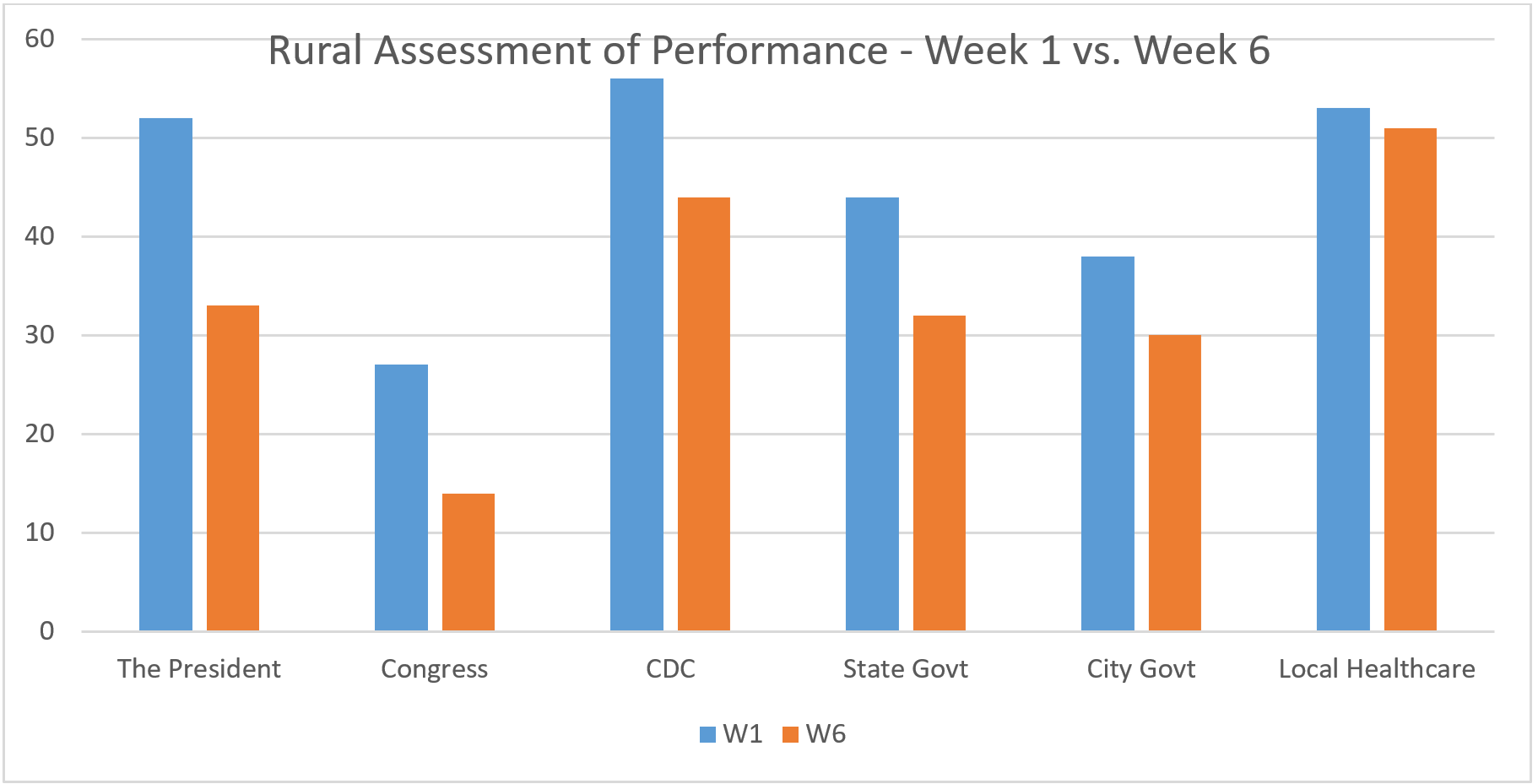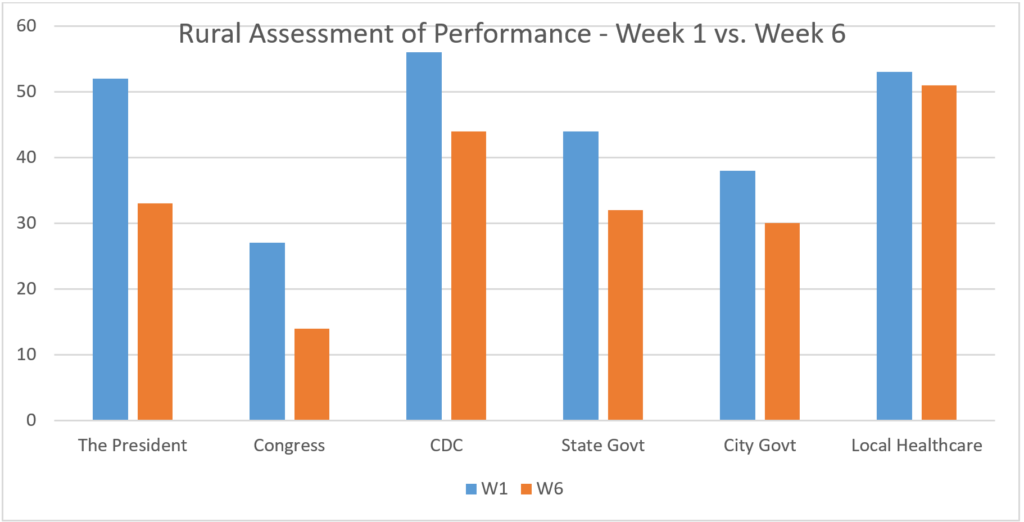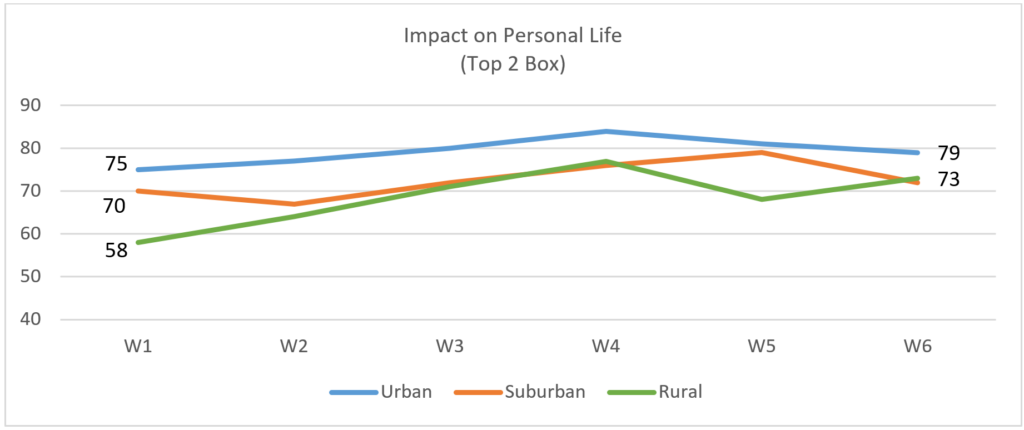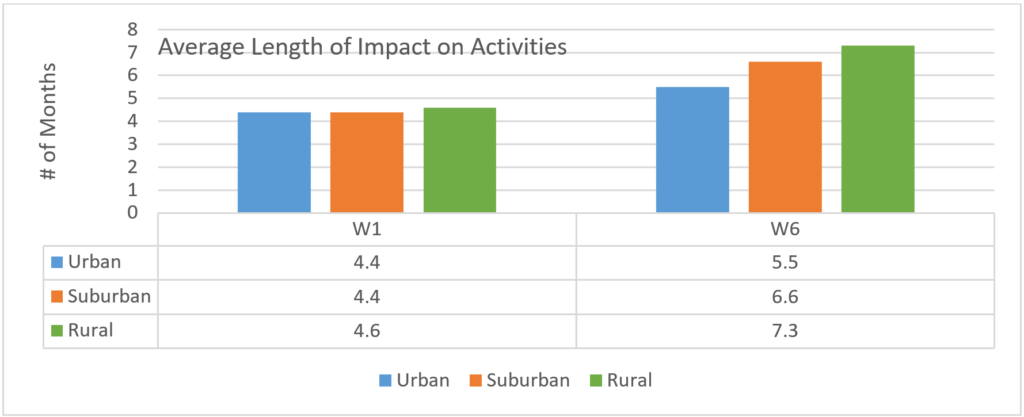As part of our research on the impact of coronavirus on the consumer marketplace, we have been tracking which government and health agencies people view as responsible for managing the response to the outbreak, and how they rate these agencies’ performance. Our data reveals a significant divide in patterns between rural, urban, and suburban attitudes and how those attitudes are changing over time.
Over the past 6 weeks the agencies seen as responsible have held steady across rural, urban and suburban Americans, and performance ratings have likewise tended to hold steady. (See our previous work on the emotions that are being universally experienced during the coronavirus outbreak.) We do see a significant exception, however, among rural residents, who are increasingly unhappy with the performance of both government and health agencies.
Q: In light of the current Coronavirus situation, how would you rate the performance of the following:
Weekly waves; fielded beginning week of 3/20-27/2020 through 4/24–5/1/2020. Wave 1 n = 1957, Wave 6 n = 1095
As seen in the table above, the only institution where rural respondents didn’t demonstrate a significant decrease in perceived performance over the past 6 weeks was for local healthcare.
Note: Rural respondents consistently have identified as more politically conservative and more likely to identify as Republican, while Urban respondents have been more likely to identify as Democrats. Ratings for the President (the only single-party affiliated measurement) demonstrated a strong initial partisan bump among Rural residents, but these results have trended significantly downward. In fact, Rural respondents now rate the President’s performance less favorably than Urban respondents.
This consistent negative trend (without regard for party affiliation) is telling us something… but what?
To understand, we looked for location- and time-based patterns on a variety of questions, including:
- Being more/less interested in reopening society activities
- Being more/less comfortable with reopening activities
- Showing different patterns in behavioral changes because of the virus
In all of these areas, little difference has been seen and no patterns have emerged over time. Generally, rural Americans are concerned about the same things, with consistent intensity, and making similar changes as those in other locales.
However, responses to two questions show that rural residents may have initially seen themselves as more insulated from the outbreak’s effects, and those attitudes appear to be changing. Now they see coronavirus as having a more significant impact on their lives, and expect those changes to last longer:
Q: Thinking about your personal life, once the Coronavirus outbreak has passed how much do you think this period will impact or change the way you, personally, go about your day-to-day life?
Weekly waves; fielded beginning week of 3/20-27/2020 through 4/24–5/1/2020. Wave 1 n = 1957, Wave 6 n = 1095
Q: How long do you think your day-to-day activities will be impacted due to the Coronavirus outbreak?
Weekly waves; fielded beginning week of 3/20-27/2020 through 4/24–5/1/2020. Wave 1 n = 1957, Wave 6 n = 1095
Initially, rural residents showed much lower expectation of personal change to their day-to-day lives, but now that expectation is in line with that seen in other regions. And while respondents in all location types started with similar expectations of how long day-to-day impact will be felt, now rural respondents exceed all others in the length of time they anticipate coronavirus will affect their lives. In short, they’ve gone from the most positive group nationally to much more negative. These changes are likely contributing to their more skeptical assessment of institutional performance.
What does this mean for business?
As we’ve pointed out, emotions are running high across the entire country. Those emotions are driving changes in behaviors and attitudes; judgments about institutional and organizational actions can impact even long-held beliefs. Consumers may be impatient with actions that have been taken, but whether they are in places that have been strongly impacted by the virus or anticipate its effects in the future, they recognize these actions contribute to a greater public good.
Previous research, previous learnings, previous assumptions, and previous loyalties may no longer hold true. “Waiting it out” is not a strategy. Businesses will need to invest in developing greater understanding of the changing attitudes that have been activated by these times, and demonstrate empathy and connection with the world that is changing around us all.













